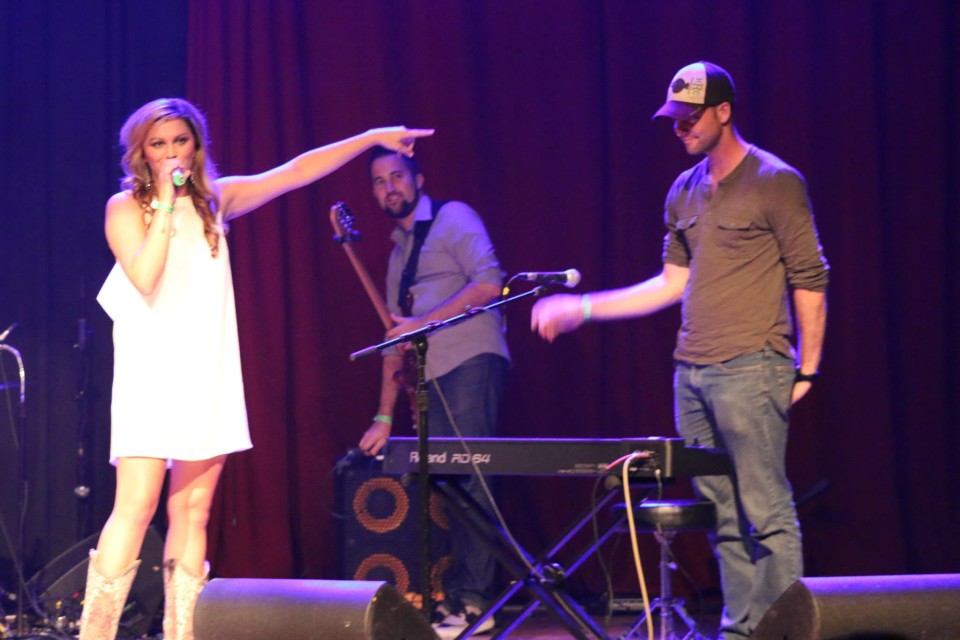Top Ten Performance Tips – How to Win Over the Crowd When You Play
Playing in front of a crowd, especially a large group of people who have never heard you before, can be a daunting task. Below are the top ten tricks to drawing people into your performance.
1) Know your music cold. While obvious to some, many rookie performers fail to master their own material before they perform. While it’s okay from time to time to look down at a lead sheet, chord progression, lyric sheet, etc., for the most part it’s best to know your music by heart and have it to the point where you don’t really have to think too hard about what’s coming next in the song (chords, lyrics, etc). Knowing the music cold will enable you to focus your attention on delivering a great performance and on working the crowd.
2) Look like you mean it. You don’t need to be completely melodramatic about it, but people will enjoy your performance much more if you look like you’re into it. So, smile, tap your foot, bob your head, acknowledge the other players on the bandstand. Try not to be disingenuous about what you do; but, look like you’re totally immersed in your performance. Your enthusiasm will be contagious.
3) Be a team player. If you’re performing in a band, or any ensemble of musicians that includes more than just you up there, pay attention to overall sound and not just your own. Try to get the mix of different players to sound as good as possible together. It can be tempting to overplay, or crank your amp really loud; but, when you drown out the other members of the group you look like a show off. Overplaying also irritates the other members of the group, causing them to overplay and it creates an overall discord on-stage. Instead of trying to steal the show, fall in love with the overall sound of the group and do your part to make it sound as good as possible.
4) Connect with visual cues from the audience. Assuming you know your music cold, make a point to scan the audience for visual cues about what people like and don’t like. Every crowd is a little bit different (which can have a lot to do with the town you’re in, the age of the crowd, the venue, time of day, etc). When people start to tap their feet and make a lot of eye contact with you, that means they like what they hear. If they start to turn away and look disinterested, something may be amiss (but not necessarily). By watching their reactions you can make little adjustments on the fly. For example, you might make a quick adjustment to the set list to play more uptempo tunes if the crowd is itching to dance. Or you might pick up the pace on a song if it’s visibly clear that the tune is dragging a bit.
5) Perfect your stage banter. If you’re on the mic, you get the added privilege of chit-chatting with the crowd between songs. Now, there is definitely an art to this, and there is definitely more than one way to be good a stage banter. Nevertheless, a few fundamental principles exist. First, make sure the banter is entertaining for them, the audience, and not just you. That’s not to say you can’t talk about yourself (e.g. where you were when you wrote a song, etc). However, make sure that your banter is compelling for the crowd and doesn’t only pertain to you and your little inside jokes and whatnot. Second, cut to the chase. Banter that drones on and on gets boring; people want to be entertained. When in doubt, shut up and play music. Third, engage participation from people not on the mic into your banter. For instance, make a joke about the bass player so everyone looks at him/her. Hopefully the bass player will play along. Or, get the audience to cheer, clap, raise their hands (“Hello New York!” or “How many of you have ever …”). If you’re on tour, make a comment about the town you’re playing and/or the venue. Last, refer to point 4) above and use your best judgment.
6) Mingle with the people between sets. People will cheer for you more, attend more shows, and buy more merch if they feel that you’re a cool person and you connect with them face to face. It’s been this way since the dawn of time in every industry in the world; i.e. nothing is better for business and winning people over than quality one-on-one face time. Music is no different. Make friends with people, ask them about their lives, their favorite bands, their favorite foods, whatever; you’ll see, they’ll take more of an interest in your music when they like you.
7) Take care of your gear, instruments, equipment. If you want to sound your best, you need to mind your gear. This means protecting your equipment in transit to shows and when in storage, regularly changing out strings and loose/damaged parts, upgrading to better gear as your budget permits (especially for electronic gear). Tools of the trade are key: pro gear + pro player = pro sound.
8) Don’t dwell on mistakes. Humans make mistakes, and live performances are a hotbed for them. If you or someone else on-stage screws up, play it off and let it go. The best in the world have to fake it to the finish line at times and you’re no different. Just keep in mind, a performance is not a recording or writing session. There are no do-overs, so just go with the flow and act like everything’s cool.
9) Take a few extra seconds to make tuning/EQ adjustments where needed. Some may disagree, but unlike point number 8) I think if you notice a glaring problem at the start of a song with being out of tune or having a major EQ problem, stop the song within the first few seconds of playing and make the adjustment. Trying to fight through a whole 4 minute song when the guitar player is massively out of tune is a great way to irritate the heck out of everyone in the room, whether they’re in the crowd or on the bandstand.
10) Become “best buds” with sound techs. If you have professional sound people working at the venue, make friends not enemies with these people. They have your sound in their hands and if they don’t like you because you come across as a jerk, they have the power to ruin your set by ignoring problems with the balance, or even purposely messing with your sound. By contrast, if they think you’re cool, they’ll work hard to balance out your mix and make you sound amazing. To make friends with sound people, respect their turf (this is their venue, so be a respectful visitor), be swift in setting up and tearing down your gear (no dilly-dallying), don’t unplug while the board is turned on, don’t mess with house gear without permission, and at sound checks use “please” and “thank you” when asking for adjustments in the monitors or overall sound.
Okay, that’s it. Hopefully these tips will help you with your performances. Best of luck to you!





